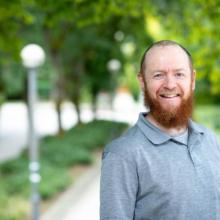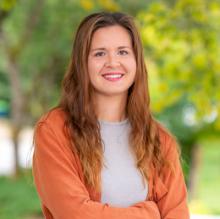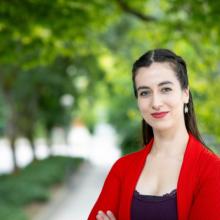My doctoral research introduces the questions from critical disability studies and disability theatre studies to the world of ancient Roman performance to examine and interpret representation of disability on the ancient Roman comic stage and contribute to a reconsideration of Roman social history by focusing on the cultural discrimination of persons with disability.
Research Description
Just as race, class, and gender have reshaped the scholarly discourse, critical disability studies have become a useful academic tool to reframe discussions of ancient texts. My doctoral research introduces the questions from critical disability studies and disability theatre studies to the world of ancient Roman performance with the objectives to examine and interpret representation of disability on the ancient Roman comic stage and contribute to a reconsideration of Roman social history by focusing on the cultural discrimination of persons with disability. PSI fellowship advances the work of one of my dissertation chapters to develop an innovative multidisciplinary theatrical project, and to disseminate it through cultural and theatrical organizations in Vancouver. Exploring the representation of physical deformities as a category of disability, I will recreate ancient padded bodysuit, known to be worn in comedies and used to represent a comic, distorted body. This under-costume served to visually reinforce deviation from social norms that comic characters represented in ancient Greek and Roman societies. Building padded bodysuits would allow me to interpret the social dimension of representation of different bodies on stage and help to understand what degree of “othering” was at play when different social groups (women, slaves, the elderly, etc.) were coded by the presence or absence of padded bodysuits.
What does being a Public Scholar mean to you?
Being a ‘Public Scholar’ means first to acknowledge the reality in which this pleonastic expression is needed, then to move away from the self-sufficient ‘Vivat Academia! Vivant Professores!’ so as to be able to deeply commit to dissemination and use of knowledge for the public good.
In what ways do you think the PhD experience can be re-imagined with the Public Scholars Initiative?
Speaking for my own field, I believe that PSI initiative helps to step out of the often-hermetic circles of academia, it helps to “bring them to life”, sort to speak. For a long time, the classical scholarship was setting the model for humanistic studies and now, every so often, it fails to understand that the research should move past this model. Public Scholar Initiative enables the young scholars to re-imagine themselves and their research by providing the means and support to expand the space of academic reach beyond conference halls, classrooms, and scientific publications, and engage with the burning questions of the society we live in.
How do you envision connecting your PhD work with broader career possibilities?
It is my plan and wish to continue ‘walking the hyphen’ between academia and arts after I graduate. My highest professional hope is to be able to bring my academic knowledge to the work with theatre-makers in the staging of ancient Greek and Roman plays, thus bringing the classical theatre to the public eye. Working with theatre community partners in Vancouver is a step towards the realization of this hope, as it will help me gain the experience in the environment that I may productively engage with in post-graduation times.
How does your research engage with the larger community and social partners?
I will experiment with the use of the comic under-costume on the stage and document the effects it had on the actors wearing them and their stage movement. Experimenting with the usage of such a costume on stage will be done in collaboration with a local community theatre, United Players of Vancouver, the resident company of the Jericho Arts Centre. This would involve working with directors, designers, and stage managers from the community and would impact their multiple productions. I will also present the outcomes of the research as a guest lecturer at Pharos - the Canadian-Hellenic Cultural Society. The society was founded in 1980 with the intent to disseminate all aspects of Greek culture, from ancient to modern, among diverse audiences, general and specialist alike. The lecturers who present there are predominately academic public scholars, and their lectures, envisioned for the general public, belong to the domain of public scholarship.
Why did you decide to pursue a graduate degree?
I have been in the classics since I was fourteen years old and a couple of years after my Master's Degree that I spent away from academia and form the classics were the years in which I felt most alienated from whom I really was. So, in a way, a doctoral degree was a way back to my lifetime passion. On the other hand, it wanted to have that extra time to dwell in the world of rigorous research while figuring out more concrete career goals.
Why did you choose to come to British Columbia and study at UBC?
I wanted to be trained at a North American university as they seemed to offer a different approach to the classics than the one I experienced in my European upbringing. I chose UBC in particular because of my department’s strong commitment to interdisciplinarity within our broader field, all the amazing forward-thinking scholars that constitute it but, most of all, because of my current supervisor. Dr. C.W. Marshall’s scholarly production and the wide range of his research and professional interests encouraged and inspired me to take my own career to a different route.
It is my plan and wish to continue ‘walking the hyphen’ between academia and arts after I graduate. My highest professional hope is to be able to bring my academic knowledge to the work with theatre-makers in the staging of ancient Greek and Roman plays, thus bringing the classical theatre to the public eye.




